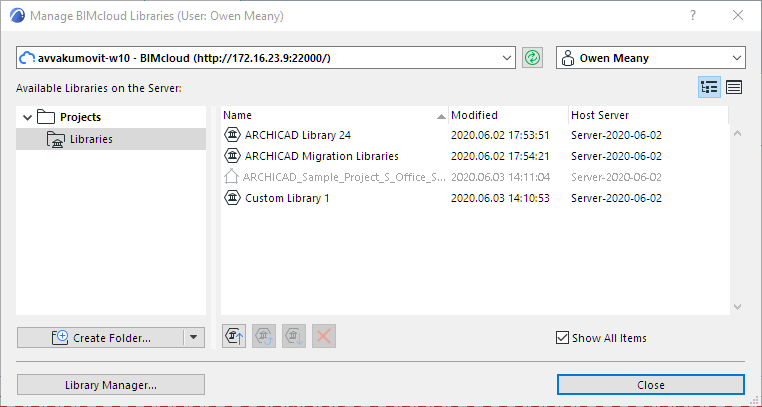
Use the Manage BIMcloud Libraries dialog box to view, upload and otherwise manage the libraries on any BIMcloud.
To use a BIMcloud Library in a project (either solo or Teamwork), that library must first be uploaded to the BIMcloud, using this dialog box.

Note: In a Teamwork project, you must be a Project or Server Administrator to use this dialog box.
To open this dialog box, do one of the following:
•use File > Libraries and Objects > Manage BIMcloud Libraries
•From Library Manager, click the Manage BIMcloud Libraries icon
At the top of the dialog box, use the pop-ups to choose a BIMcloud and to log in.
See Log in to BIMcloud.
Click the green Refresh button as needed to refresh the library list and user pop-up information shown in this dialog box.
Use either the Tree view, or switch to a Flat list using the icons at top right.
Tree view
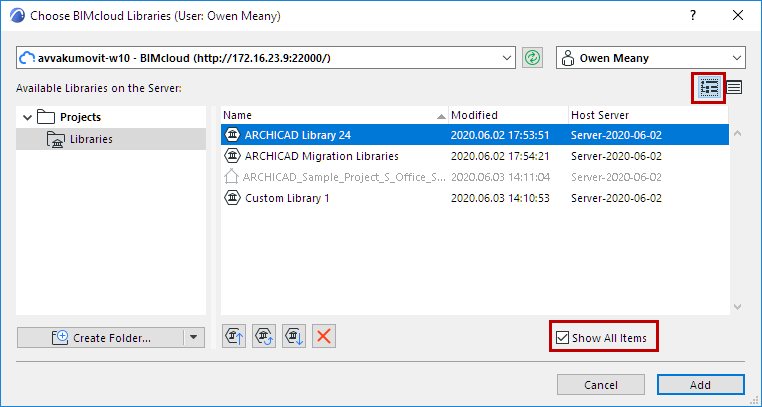
The tree view displays not only libraries, but also their position within the hierarchy of BIMcloud Manager (Projects root).
Both projects and libraries are listed by default. To show the libraries only, uncheck Show All Items.
In Tree view, use Create Folder to create a new one on the Projects root.
Required permission:
•Simplified Management: Project or Server Administrator
•Detailed Management: Modify details and Modify folder content for the destination folder
The folder is created immediately; you can delete or otherwise manage it only through the browser-based BIMcloud Manager. (Click the Manage Folders link from the New Folder drop-down button to access the Projects page of the BIMcloud Manager.)
If a library of the same name already exists within a folder on the BIMcloud, you cannot upload it: any given library can exist only once in a given BIMcloud location.
Flat View
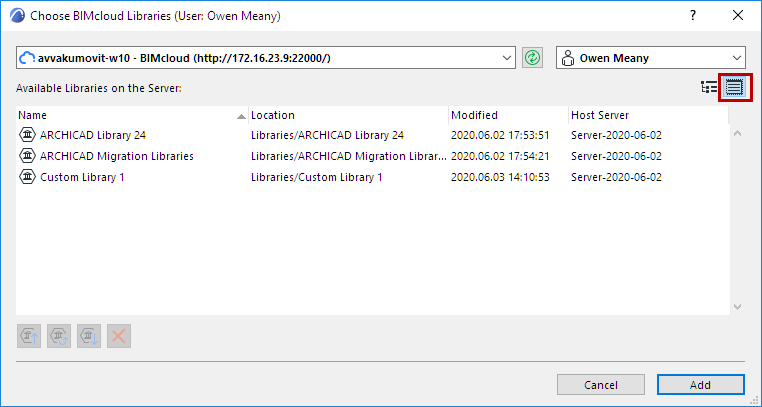
BIMcloud Libraries are listed with upload date and the address of the host server.
Update BIMcloud Library
Use this command to update a selected library (already uploaded to the BIMcloud) with a newer library of the same name.
1.Select the library to update.
2.Click Update.
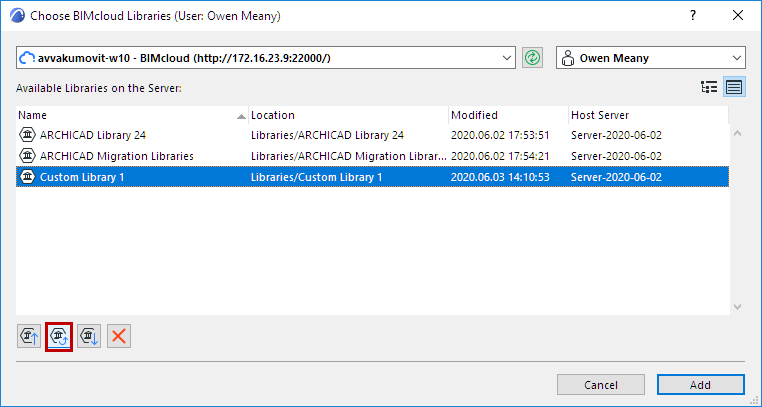
3.Browse for the library with which to replace the selected library. It must be a newer library of the same name.
4.Click Choose.
5.The feedback tells you the result of the update.
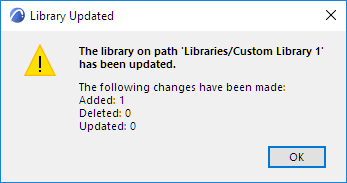

Required permissions:
•Simplified management: Project or Server administrator
•Detailed management:
-Modify folder content
-Modify details for Libraries root
If you do not have permission to upload to a particular folder, you are prompted to choose the default folder.
1.Go to File > Libraries and Objects > Manage BIMcloud Libraries.
2.Click Upload.
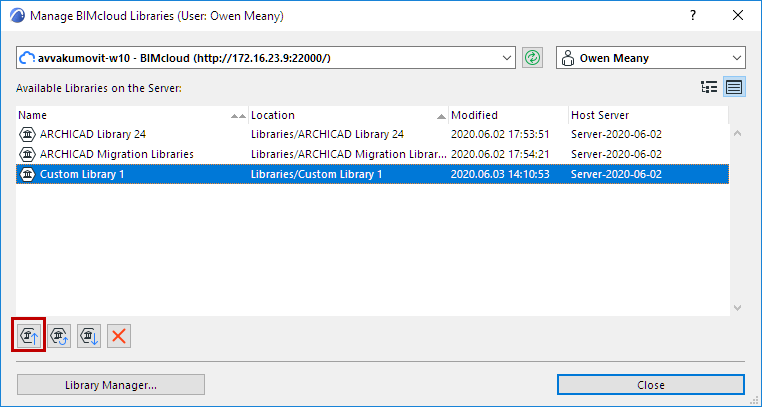
3.Browse for the library you wish to upload. Uploaded libraries can include .pla or .lcf files, or any folders. You cannot upload individual gsm files; you can only upload .lcf or .pla files, and regular folders.
4.Click Open.
5.Check Host Server: The default host server is shown, where the library will be uploaded.
To upload a library to a different BIMcloud Server (other than the default), click the pop-up.
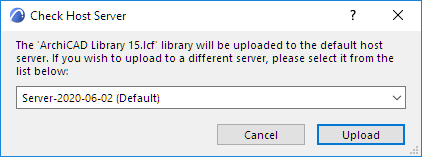
Required permissions:
•Simplified management: Server administrator
•Detailed management: Modify hosted data on BIMcloud Server
6.Click Upload.
Once libraries are uploaded, individual users can add these BIMcloud Libraries to projects, either solo or Teamwork.
See also Add BIMcloud Library.
Upload Individual Objects to BIMcloud
To upload individual objects to the BIMcloud, first place them into a folder, then upload the folder, as described above (Upload a Library to BIMcloud). The result is a BIMcloud Library.
You can also upload individual object files and folders from the BIMcloud:
From the Projects Page of BIMcloud Manager, use the Upload Files/Upload Folders command. The result is individual files and folders uploaded to BIMcloud’s file system.
See the BIMcloud User Guide for details.
Download Library from BIMcloud
Use the Download command to download the selected library to the location of your choice.
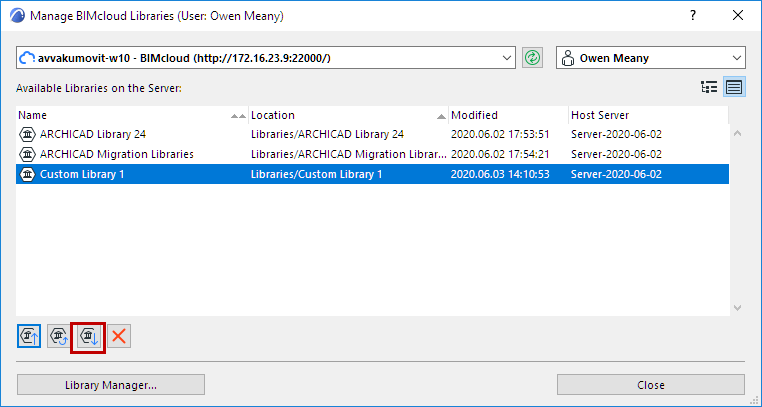
Delete Library from BIMcloud
Click Delete from the Manage BIMcloud Libraries dialog.
Required permissions:
•Simplified management: Project or Server administrator
•Detailed management: Delete/Remove content for library root